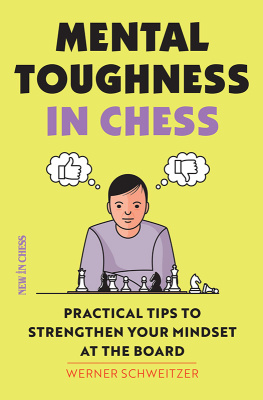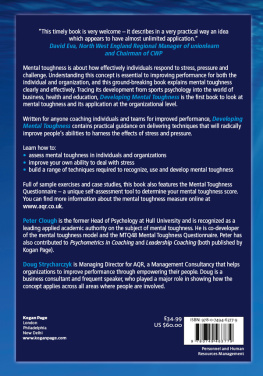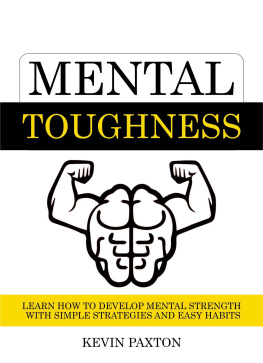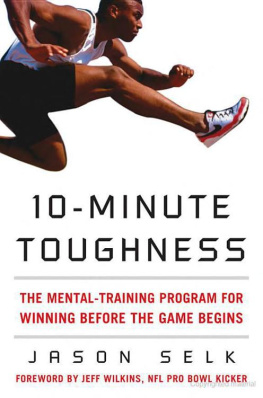Werner Schweitzer - Mental Toughness in Chess
Here you can read online Werner Schweitzer - Mental Toughness in Chess full text of the book (entire story) in english for free. Download pdf and epub, get meaning, cover and reviews about this ebook. publisher: New in Chess, genre: Religion. Description of the work, (preface) as well as reviews are available. Best literature library LitArk.com created for fans of good reading and offers a wide selection of genres:
Romance novel
Science fiction
Adventure
Detective
Science
History
Home and family
Prose
Art
Politics
Computer
Non-fiction
Religion
Business
Children
Humor
Choose a favorite category and find really read worthwhile books. Enjoy immersion in the world of imagination, feel the emotions of the characters or learn something new for yourself, make an fascinating discovery.
- Book:Mental Toughness in Chess
- Author:
- Publisher:New in Chess
- Genre:
- Rating:5 / 5
- Favourites:Add to favourites
- Your mark:
- 100
- 1
- 2
- 3
- 4
- 5
Mental Toughness in Chess: summary, description and annotation
We offer to read an annotation, description, summary or preface (depends on what the author of the book "Mental Toughness in Chess" wrote himself). If you haven't found the necessary information about the book — write in the comments, we will try to find it.
Mental Toughness in Chess — read online for free the complete book (whole text) full work
Below is the text of the book, divided by pages. System saving the place of the last page read, allows you to conveniently read the book "Mental Toughness in Chess" online for free, without having to search again every time where you left off. Put a bookmark, and you can go to the page where you finished reading at any time.
Font size:
Interval:
Bookmark:
Mental Toughness in Chess
Werner Schweitzer
Mental Toughness in Chess
Practical Tips to Strengthen Your Mindset at the Board
New In Chess 2020
2020 New In Chess
Published by New In Chess, Alkmaar, The Netherlands
www.newinchess.com
All rights reserved. No part of this book may be reproduced, stored in a retrieval system or transmitted in any form or by any means, electronic, mechanical, photocopying, recording or otherwise, without the prior written permission from the publisher.
Cover design: Volken Beck
Illustrations: Guido van Gerven
Translation: Bob Sherwood
Editing and typesetting: Peter Boel
Production: Anton Schermer, Joop de Groot
Have you found any errors in this book?
Please send your remarks to and implement them in a possible next edition.
ISBN: 978-90-5691-858-3
Preface More Success through Mental Toughness
A good mental state is often decisive in determining success or failure. In professional sports, the concept of mental toughness has long been a subject of discussion because there it is crucial for exploiting ones full potential at the critical moment. But even outside professional sports, each of us can make better use of his own potential and profit from more mental toughness, and can in this way achieve extraordinary things. But it is just as important to improve our quality of life and, through greater contentment, to bring more joy and success into our lives.
The notion of mental refers to our thoughts and perceptions. The words and images we think and imagine in our heads shape our emotional life, and are thus responsible for our behavior. The purposeful control of words and pictures can cause changes in our feelings. Through these perceptions we influence the release of endogenous endorphins, so-called happiness hormones. This is because every word or picture we perceive triggers certain neuro-transmitters in our brain.
What our minds present to us depends in many cases on the nature of our inner dialogue. A positive inner dialogue enables us to create beneficial thoughts. We develop attitudes that channel our behavior and our actions toward success in all areas of life: at work, in our private life and also when playing chess.
But lasting changes in our behavior can occur only through frequent repetition of new, helpful thoughts. Especially if we have used unfavorable thought patterns for a long time, our mental habits must be broken. Through constant repetition of these helpful thoughts, we succeed in loosening up disturbing ways of thinking and transforming them into a positive attitude.
In chess, the following mental skills play an important role:
recognizing your own strengths and weaknesses
increasing ones stability
self-assuredness
avoiding overestimation or underestimation of your
opponent
resolve and rapidity in making decisions
dealing with disturbing thoughts and feelings
increasing stamina and concentration
coping with defeats (and victories as well).
In addition, factors such as motivation, anxiety, expectation, and recovery are of decisive importance.
Mental toughness can be trained in the same way as technical chess skills. In this book, I will explore different aspects of these mental states and processes, and will introduce and describe methods and techniques that can be easily applied. If you only read this book, you will get a good overview, but it will not make a lot of difference. Sustained mental improvement and success will come only after you have used the methods described here, especially if you repeat them regularly.
Perhaps some of you may wonder at this point why, if I am supposedly so strong mentally, my rating oscillates between 2050 and 2100 only. Perhaps I can best answer this with a comparison: just the fact that I am mentally tough doesnt enable me to climb Mount Everest. Mental strength is one of the factors that make a good chess player, but its just one of many.
It was not until I was 35 that I started to seriously engage in chess, joining a club for the first time. My two or three teen years in school chess enabled me to start out fairly well. Age has advantages also in chess: one can draw on experience. But only if you have that experience and I just do not have it. And all the same, ones chess development progresses more slowly after a certain age. So even if I have less potential at my disposal i.e., less talent and less training , because I have 20 years less chess experience, my mental strength allows me to draw more easily upon the chess potential I do have. This potential nevertheless remains limited and does not get any bigger. Besides, chess for me is a hobby. I do invest time in training and playing, too, but only to the extent of a hobby. However, I am always happy when I achieve a good result against a strong player.
The basis of this book is a collection of the monthly chess columns which I wrote over several years for the Austrian chess magazine Schach Aktiv. I wish you a lot of fun and enjoyment in reading it, and above all more mental toughness in chess and perhaps in other areas of life as well.
For further information: www.mental-gewinnen.com#.
Werner Schweitzer,
Vienna, December 2019
Part I Mental Toughness Can Be Trained
Strengthen Your Strengths
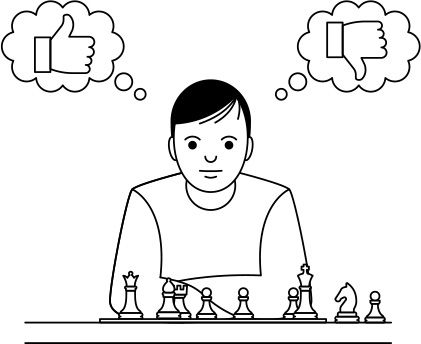
Our upbringing, our educational system, and probably even our entire culture teach us not to accept our weaknesses. In an effort to get better, many ask themselves what is not going well and what they should do differently. All these questions focus on their own weaknesses.
This is tedious and demotivating. In addition, this approach has a major disadvantage: weaknesses can usually be improved only with great effort. It is much more efficient and effective to focus on your strengths. Real improvement is only possible if you focus on your talents. Only there can you become exceptionally good.
Of course you should not completely forget about your weaknesses, but here we are talking about damage control.
Example: a tactically strong player is one who hardly ever calculates a variation incorrectly. His weakness may lie in a lack of positional flair. Nevertheless, he wins many games, as he is better able to keep a good overview in complex situations.
Since he wants to get better, he tries to improve positionally. Thats okay, but he will never reach the level of the best positional players. Here, it is enough to keep the damage to a minimum. It is much more important for him to cultivate, maintain, and perhaps even improve his ability to calculate well and error-free.
Here are five steps for developing your strengths:
1. Recognize your strengths.
If you want to concentrate on your strengths, you first have to know what they are. Analyze your games with a strong player and pay attention to what you are doing well. What makes you particularly happy in training? Ask your chess friends, too, what strengths they recognize in your play. They often have an amazingly neutral and objective perspective.
2. Recognize your weaknesses.
This is part of your comprehensive self-knowledge. What weaknesses do you have? Again, ask other chess players. This is perhaps not so enjoyable, but it will take you further.
3. Concentrate on your strengths.
Find out how to increase your strengths. What kind of training is the best way to boost your strengths?
4. Turn your strengths into actions.
Which openings are suited to your strengths? How should you organize your games so that your strengths are fostered in the best way?
Next pageFont size:
Interval:
Bookmark:
Similar books «Mental Toughness in Chess»
Look at similar books to Mental Toughness in Chess. We have selected literature similar in name and meaning in the hope of providing readers with more options to find new, interesting, not yet read works.
Discussion, reviews of the book Mental Toughness in Chess and just readers' own opinions. Leave your comments, write what you think about the work, its meaning or the main characters. Specify what exactly you liked and what you didn't like, and why you think so.

